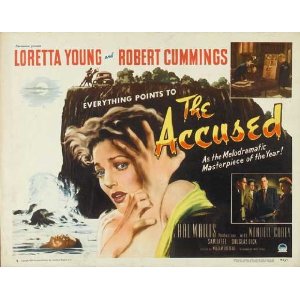
THE ACCUSED
US, 1948, 101 minutes, Black and white.
Loretta Young, Robert Cummings, Wendell Corey, Sam Jaffe, Douglas Dick.
Directed by William Dieterle.
The Accused is a Loretta Young vehicle, an example of melodramatic soap opera of the cinema of the '40s. Loretta Young had just won an Oscar for her performance in The Farmer's Daughter (1947). She had appeared in films in all through the '30s and '40s and was soon to move into a successful television career. At this time she appeared in a number of similar films like Paula, Keys of the City, Cause for Alarm. Robert Cummings is a pleasant lead and Wendell Corey gives yet another of his sardonic quiet detective performances.
Direction is by William Dieterle, who had made so many of the excellent Warner Brothers biographies of the '30s. He made a number of thrillers at Paramount at this time, e.g. The Turning Point with William Holden. The film is interesting in its emphasis on psychology, both in its portrayal of the heroine trying to cover up her man slaughter and in the fact that she is a lecturer in Psychology. Dated, but an entertaining example of this kind of '40s production.
1. An entertaining film? 1940s soap opera? Star vehicle for Loretta Young?
2. Its adult theme? Successful entertainment? Paramount '40s production: black and white photography, California settings, the style for the star?
3. Loretta Young and her presence, personality? Audience identification with her? Sympathy? The action as seen through her eyes?
4. The mystery of the opening: suspicions, Wilma wandering, the lift in the truck, arriving home exhausted, the blood on the blouse, the suspicions of the housekeeper and the introduction of the flashback? The impact of the flashback: Wilma as Professor of Psychology, her knowledge of psychology and its language and jargon, her being excellent as a theoretician, not understanding it for her own life, the administration of the exam? Her coping with students? Her being stereotyped by them? Bill and his arrogant response and her wanting to help him? The question in the exam and its later use? The appointment, missing the bus, the car drive and their talking, the drink and smoke, the beach sequence? Her being put in a compromising situation? His advance and her inability to deal with it? Her violent reaction? The covering up of his death, the facts of the cover up not being revealed till later in the other flashback? Audience understanding of Wilma, sympathy for her, judgment on her not telling the police? Wilma and her work at the university, her illness, hospitalisation? Her coping mechanisms? Her decision to conceal the truth? The funeral? The encounters with Warren Ford and discussions about Bill? Dorgan and his presence? The funeral, the discussions with Dorgan? Her continued covering up, writing the second note? Her thinking she was managing? The complexity of her falling in love with Warren and her discussions with him? Dorgan's investigations - and the visit to the morgue, the reconstruction of the crime and the re-enactment, the discussions about the manner of death? The boxing sequence and her imagining the fighter as Bill and her breakdown? The dilemma about her love for Warren? Covering the truth? The court case and Warren's defending her? Credible behaviour? melodramatic behaviour, suitable for this kind of soap opera? Warren as pleasant character, relationship with Bill, the outings with Wilma, his falling in love with her, the boxing? What did he know, not know? Admit to himself? His protecting Wilma? The manner of his defence in the courtroom? Their future together?
8. Dorgan as the efficient policeman, seemingly nonchalant, suspicions and investigation? The interrogation of the student and putting Wilma at ease with Suzanne under suspicion? The morgue and the doctor at the morgue? The re-enactment of the death and Wilma's bashing? His confrontation of Wilma? His being willing to lose the court case?
9. Bill and the smug arrogant type, the explanation of his background, his cleverness? His behaviour towards Wilma in the exam, the drive. the discussions, his advance? Did he deserve his death?
10. The court case, the plea to the jury, audience sympathies, wanting Wilma to be exonerated?
11. The stock characters for this kind of melodrama? The perennial appeal for audiences? Romance, love? Heightened emotions? The suffering heroine and her final happiness? Insight via melodrama?